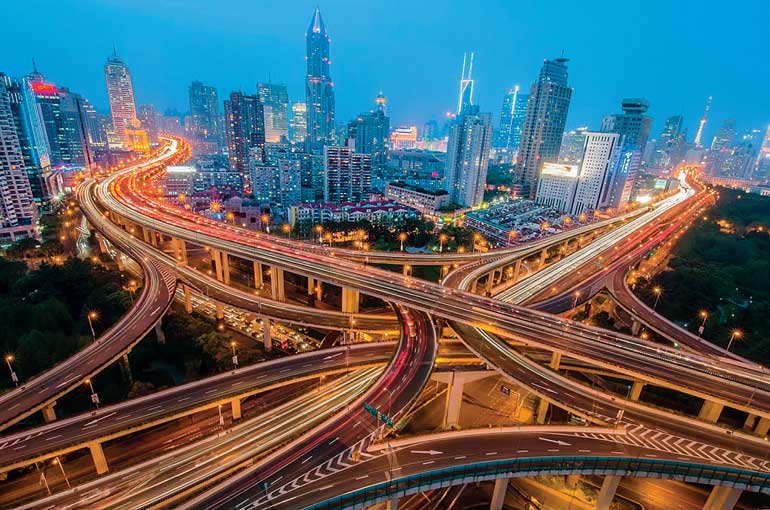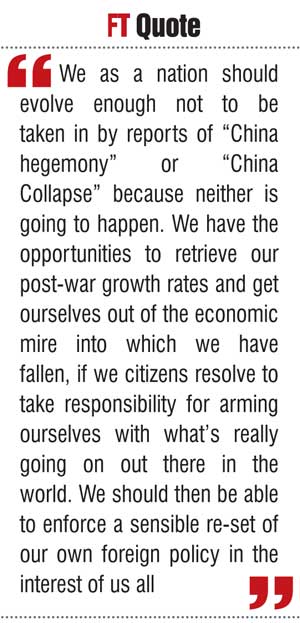Saturday Jan 17, 2026
Saturday Jan 17, 2026
Saturday, 9 July 2016 00:00 - - {{hitsCtrl.values.hits}}

Modern China is very Western in its new landscape of iconic new buildings towering over multi-lane roads, a gleaming testament to China’s outstanding contemporary architects
Ancient cities, misty mountain tops rising to cloudy heavens, beautiful landscapes, wise old men teaching philosophy, swimming fish, flowing rivers, designer trees…these were the snatches of mental pictures gathered from murals and vases that I wanted to see for myself, in what was to me, the mysterious China of old.
Full of admiration for the successful and assertive China of today, its stature embodied in the quiet self-confidence of its representatives in various international bodies that I had met and interacted with over the last few years accompanying my husband  on his diplomatic assignments, I longed to see this giant of a nation of 1.4 billion people and its remarkable emergence into such an energetic powerhouse extending its hand and sharing its success across the developing world into Africa, Latin America and Asia, including to our war-ravaged island of Sri Lanka when we needed it most.
on his diplomatic assignments, I longed to see this giant of a nation of 1.4 billion people and its remarkable emergence into such an energetic powerhouse extending its hand and sharing its success across the developing world into Africa, Latin America and Asia, including to our war-ravaged island of Sri Lanka when we needed it most.
When my China dream came true last month, there wasn’t the slightest trace of ancient China except in the monuments preserved for their historical value. Modern China is very Western in its new landscape of iconic new buildings towering over multi-lane roads, a gleaming testament to China’s outstanding contemporary architects.
It was truly wondrous to view the CCTV tower (which my young guide described with a laugh as “a trouser leg”) in Beijing, the Birds Nest Stadium and the Water Cube in the Olympic City, the waterfront in Shanghai with the famous TV Tower alongside massive buildings of individually impressive character, and the tallest building in China (the Shanghai Tower) just being completed, rising above all others like a watercolor of a lean mountain with its head in the clouds, but described as a ‘twisted chopstick’ by our young guide, tongue- in-cheek.
Travelling on those Chinese roads, it felt familiar, and of course I knew why. I can hardly remember how we managed before the Chinese helped us to build the new road network linking our cities. It is to our providential benefit that China’s foreign policy (as enunciated by President Xi Jinping ) includes a “sense of shared destiny” of people in all countries and thus to “make joint efforts to bring the development of Asia and beyond to a new level.” President Xi says: “You travel faster when you travel alone but you travel farther when you travel with others.”
This was fortunate for post-war Sri Lanka. Our country availed itself of the benefits of the Silk Road initiative, and the future looked bright as it raced towards high growth and visible development. “When the big river is full of water, the smaller ones will never run dry,” said President Xi, but amongst rumours of dangers to our sovereignty, the Port City Project became a major issue during the last election.
Most big projects with Chinese investment were stopped with the change of government, creating uncertainty, loss of jobs and loss of reputation as a country suitable for large-scale investments. Reality dawned a year later and in an inevitable about-turn, the new Government has had to make the economic pilgrimage back to China to bring this country back on track.
As the world order evolves and changes its shape, opportunities and options increase for countries like ours. As acronyms such as AIIB, SCO, BRICS Bank and OBOR become as familiar as UN, IMF and WTO, they in turn can widen our horizons. It is up to us citizens to ensure that those options are not closed off for us and that our country can choose the best combination in our national interest. We should resolve to educate ourselves so that we are never again fooled in droves by well-worn methods, to our own  detriment.
detriment.
The Forbidden City in the middle of Beijing with its ornate roofs, marble floors and balustrades, massive doorways painted in red leading to palaces decorated with dragon motifs symbolising imperial power, is impressive in its vastness and attention to detail in design and construction. One can imagine the awe in which the institution was held by both officials and citizens. It housed two dynasties, the Ming dynasty and Qing, for half a millennium.
Strikingly, the Monument for the People’s Heroes, a monument to those who died during the liberation and resistance wars led by Mao and the Chinese Communist Party, stands in Tiananmen Square just next door. It is also the place where the founding of the People’s Republic was declared by him.
As we drove around Beijing, I wondered how this city manages its 23 million citizens. That’s more than in the whole of Sri Lanka. But it’s a bustling city of energetic, fashionably dressed young people heading for work, many others shopping at stores with the biggest brand names in the world, sipping coffee at Starbucks and Costa Coffee and having fun with friends in restaurants and cafes serving the most delicious food I have ever eaten.
China’s culinary advantage is that it is huge and has many provinces that make up the Republic. Each region has its own authentic cuisine, in addition to the minorities who have their own variations. This makes for a deliciously diverse selection on offer; each one so beautifully presented, one is torn in making a decision. But whichever we chose totally satisfied. However one outdid all others and will remain an unforgettable memory.
This was in Shanghai and our host told us it was the best vegetarian restaurant in China. From the moment we turned into its parking lot, which was a difficult task as sleek Maseratis and Jaguars which I imagined were carrying CEOs, were waiting in line or were just pulling out of it, the place impressed. Once inside, the ambiance enhanced by the all-white décor with a minimalist character, we were treated to the most divine fifteen course meal. It appears that the taste is assured by all fruits and vegetables being carefully sourced by the restaurant which buys only from organic farmers. Beautifully presented in Parisian portions, each mouthful was a memory to cherish.
We had the opportunity to visit the offices of the Asia Pacific Daily in Shanghai, which has developed a hugely popular app for mobile phones for news from China and around the world. In its many offices engaged in other business ventures, we saw a great number of young developers creating new games, with one such company having being bought up after just a few years for several billion dollars.
The young employees are from around the world, many from the West, as Overseas Chinese come back home preferring to work in financially secure China. I never sensed the anxiety of our young friends in Europe, including of Sri Lankan descent, who worry about their opportunities of employment even after obtaining good post-graduate degrees. In China the sense instead is of massive growth, of vast reservoirs of energy and ideas, of a confident country that has only just started tapping into its epic potential.
China’s foreign policy, hoping to forge a ‘Community of Shared Destiny’ has created many relationships with regions around the world. The China-CELEAC forum in Latin America, China-Africa Cooperation, China-Arab States Cooperation Forum, etc., form the basis of their outreach to developing countries around the world and readiness to share their success in its global vision of “win-win cooperation”. This is in addition to its ‘One Belt One Road’ (or, more simply, the ‘Belt & Road’) initiative of which we were, and hopefully will remain, a part of.
Our location as an island in the Indian Ocean historically hosting many ancient traders along the silk route with long held trading relationships is an ideal hub for Silk Route Studies, by means of which we can ensure we do not lose the opportunities to benefit from the rise of our continent of Asia as a global economic superpower. It is fortunate that China which will lead this emergence has evolved a “new type of international relations”. Rather than zero-sum games and the hegemonism of former big powers which we as a country under colonialism have known intimately for over 400 years, China believes that the terms of engagement should be based on “seeking agreement” while “allowing differences”.
We as a nation should evolve enough not to be taken in by reports of “China hegemony” or “China Collapse” because neither is going to happen. We have the opportunities to retrieve our post-war growth rates and get ourselves out of the economic mire into which we have fallen, if we citizens resolve to take responsibility for arming ourselves with what’s really going on out there in the world. We should then be able to enforce a sensible re-set of our own foreign policy in the interest of us all.